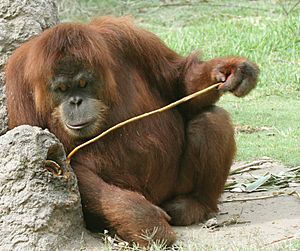Karen (orangutan) facts for kids
 |
|
| Other name(s) | Kare-Bear |
|---|---|
| Species | Sumatran orangutan |
| Sex | Female |
| Born | June 11, 1992 San Diego Zoo |
| Known for | First orangutan to have open heart surgery (1994) |
| Residence | San Diego Zoo |
| Parent(s) | Karta (mother) Otis (father) |
Karen (born June 11, 1992) is a female Sumatran orangutan famous for being a medical pioneer. On August 27, 1994, she became the first orangutan to ever have open-heart surgery. In 2021, she was also one of the first non-human animals to get a vaccine for COVID-19.
Sumatran orangutans are a critically endangered species. Because of this, Karen's health was very important. When doctors discovered she had a serious heart problem, the San Diego Zoo and UC San Diego Health medical center worked together to save her. The successful surgery was a major news story, and Karen has lived at the zoo for over 25 years since the operation.
A book about her life, Karen’s Heart: The True Story of a Brave Baby Orangutan, was published in 2018.
Contents
Early Life and a Health Scare
Karen was born at the San Diego Zoo on June 11, 1992. Her mother was Karta and her father was Otis. She was sometimes called "Kare-Bear."
A Difficult Start
In her first few days, zookeepers noticed that Karen's mother was having trouble feeding her. To make sure Karen grew up strong and healthy, the keepers decided to raise her by hand. She was later adopted by another female orangutan named Josephine.
Discovering a Problem
When Karen was two years old, her keepers saw that she was not growing as quickly as other young orangutans. A medical check-up revealed she had a heart murmur, which is an unusual sound in the heartbeat.
Further tests showed that Karen had a hole in her heart about the size of a penny. This condition is called an atrial septal defect. Doctors knew that without an operation to fix the hole, Karen would not survive.
A Groundbreaking Heart Operation
At the time, open-heart surgery was becoming a common procedure for human babies with similar heart problems. Because human and orangutan hearts are very much alike, a team of doctors decided to try the same surgery on Karen.
A team led by Dr. Stuart W. Jamieson, a surgeon who operates on the heart and chest, performed the operation. They opened Karen's chest and carefully stitched the hole in her heart to close it. The surgery was complex and took seven hours. It required help from over 100 volunteers, including surgeons, nurses, veterinarians, and zookeepers.
After the surgery, Dr. Jamieson said, "If Karen were human, I'd tell her parents that everything went fine, and her prognosis is excellent."
Recovery and Fame
Karen's recovery needed careful attention. She had a minor problem with one of her lungs, but the medical team managed it successfully.
She became the first orangutan to survive open-heart surgery. News of her success spread around the world, and she even received get-well cards from her many new fans.
Life After Surgery
Karen became a favorite with visitors at the San Diego Zoo. Her keepers describe her as "stubborn and willful," just like her mother. She is also known for a funny habit: she often rolls from place to place instead of walking.
Although orangutans and siamang gibbons are not usually housed together, Karen gets along well with them.
COVID-19 Vaccination
In 2021, Karen made headlines again. She became one of the very first non-human animals to receive a COVID-19 vaccine, showing once more that she is a true pioneer.
See also
- Ken Allen
- List of individual apes

